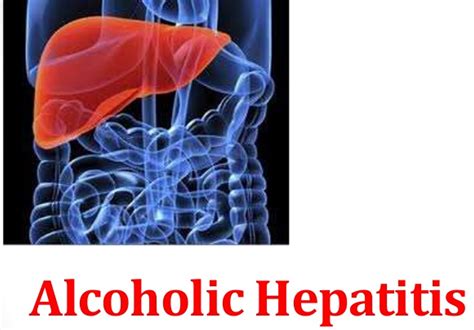Intro
Discover effective Alcoholic Hepatitis treatment options, including medication, therapy, and liver support, to manage symptoms and prevent liver damage, promoting recovery and improving liver health.
Alcoholic hepatitis is a serious and potentially life-threatening condition that affects millions of people worldwide. It is a type of liver inflammation caused by excessive alcohol consumption, which can lead to scarring, cirrhosis, and even liver failure. The importance of understanding and addressing this condition cannot be overstated, as it has significant implications for public health, healthcare systems, and individuals struggling with alcohol addiction. In this article, we will delve into the complexities of alcoholic hepatitis, its treatment options, and the latest research and developments in this field.
The prevalence of alcoholic hepatitis is a pressing concern, with studies suggesting that it affects approximately 10-20% of heavy drinkers. The condition is often underdiagnosed, and its severity can vary greatly from person to person. Factors such as the amount and duration of alcohol consumption, genetic predisposition, and the presence of underlying liver disease can all contribute to the development of alcoholic hepatitis. As the condition progresses, it can lead to a range of symptoms, including jaundice, fatigue, weight loss, and abdominal pain.
The impact of alcoholic hepatitis on individuals and society as a whole is substantial. It is a leading cause of liver-related morbidity and mortality, with significant economic and social burdens. The condition can also have a profound effect on a person's quality of life, leading to reduced productivity, increased healthcare utilization, and strained relationships. Furthermore, the stigma surrounding alcohol addiction and liver disease can create barriers to seeking help and accessing effective treatment. It is essential to address these challenges through education, awareness, and evidence-based interventions.
Understanding Alcoholic Hepatitis

To develop effective treatment strategies for alcoholic hepatitis, it is crucial to understand the underlying mechanisms of the condition. Research has shown that the liver plays a critical role in metabolizing alcohol, which can lead to the production of toxic byproducts and inflammation. This inflammation can cause damage to liver cells, leading to scarring and fibrosis. The condition can also be influenced by genetic factors, such as polymorphisms in the patatin-like phospholipase domain-containing protein 3 (PNPLA3) gene, which can affect the risk of developing alcoholic hepatitis.
Causes and Risk Factors
The causes and risk factors for alcoholic hepatitis are complex and multifaceted. Heavy alcohol consumption is the primary risk factor, with the amount and duration of drinking playing a significant role in the development of the condition. Other factors, such as malnutrition, obesity, and the presence of underlying liver disease, can also contribute to the risk of developing alcoholic hepatitis. Additionally, certain genetic variants, such as the PNPLA3 gene, can increase an individual's susceptibility to the condition.Treatment Options for Alcoholic Hepatitis

The treatment of alcoholic hepatitis depends on the severity of the condition and the individual's overall health. The primary goals of treatment are to reduce inflammation, promote liver regeneration, and prevent further liver damage. The following are some of the most common treatment options for alcoholic hepatitis:
- Abstinence from alcohol: The most critical step in treating alcoholic hepatitis is to stop drinking alcohol. This can help reduce inflammation and promote liver regeneration.
- Corticosteroids: Corticosteroids, such as prednisolone, can be used to reduce inflammation and improve liver function.
- Pentoxifylline: Pentoxifylline is a medication that can help reduce inflammation and improve liver function.
- Nutritional support: Malnutrition is common in individuals with alcoholic hepatitis, and nutritional support can help promote liver regeneration and improve overall health.
- Liver transplantation: In severe cases of alcoholic hepatitis, liver transplantation may be necessary.
Pharmacological Interventions
Pharmacological interventions play a critical role in the treatment of alcoholic hepatitis. Corticosteroids, such as prednisolone, are commonly used to reduce inflammation and improve liver function. Pentoxifylline is another medication that has been shown to be effective in reducing inflammation and improving liver function. Other medications, such as anti-tumor necrosis factor-alpha (TNF-alpha) agents, have also been investigated as potential treatments for alcoholic hepatitis.Lifestyle Modifications and Support

In addition to pharmacological interventions, lifestyle modifications and support are essential components of the treatment plan for alcoholic hepatitis. The following are some of the most important lifestyle modifications and support strategies:
- Abstinence from alcohol: As mentioned earlier, abstinence from alcohol is critical in treating alcoholic hepatitis.
- Healthy diet: A healthy diet that is rich in fruits, vegetables, and whole grains can help promote liver regeneration and improve overall health.
- Regular exercise: Regular exercise can help improve liver function and overall health.
- Stress management: Stress management techniques, such as meditation and yoga, can help reduce stress and promote overall well-being.
- Support groups: Support groups, such as Alcoholics Anonymous, can provide emotional support and help individuals stay sober.
Nutritional Support and Counseling
Nutritional support and counseling are critical components of the treatment plan for alcoholic hepatitis. Malnutrition is common in individuals with alcoholic hepatitis, and nutritional support can help promote liver regeneration and improve overall health. A healthy diet that is rich in fruits, vegetables, and whole grains can help provide essential nutrients and promote overall health. Additionally, counseling can help individuals develop healthy eating habits and improve their overall nutritional status.Future Directions and Emerging Therapies

The treatment of alcoholic hepatitis is a rapidly evolving field, with new and emerging therapies being investigated. Some of the most promising emerging therapies include:
- Anti-TNF-alpha agents: Anti-TNF-alpha agents have been shown to be effective in reducing inflammation and improving liver function in individuals with alcoholic hepatitis.
- Stem cell therapy: Stem cell therapy has been investigated as a potential treatment for alcoholic hepatitis, with promising results.
- Gene therapy: Gene therapy has been investigated as a potential treatment for alcoholic hepatitis, with promising results.
Personalized Medicine and Precision Health
Personalized medicine and precision health are critical components of the treatment plan for alcoholic hepatitis. Genetic testing can help identify individuals who are at high risk of developing alcoholic hepatitis, and personalized treatment plans can be developed to address the individual's specific needs. Additionally, precision health strategies, such as precision nutrition and precision exercise, can help promote liver regeneration and improve overall health.What are the symptoms of alcoholic hepatitis?
+The symptoms of alcoholic hepatitis can vary greatly from person to person, but common symptoms include jaundice, fatigue, weight loss, and abdominal pain.
How is alcoholic hepatitis diagnosed?
+Alcoholic hepatitis is typically diagnosed through a combination of physical examination, laboratory tests, and imaging studies.
What are the treatment options for alcoholic hepatitis?
+The treatment options for alcoholic hepatitis depend on the severity of the condition and the individual's overall health, but common treatment options include abstinence from alcohol, corticosteroids, pentoxifylline, nutritional support, and liver transplantation.
Can alcoholic hepatitis be prevented?
+Yes, alcoholic hepatitis can be prevented by avoiding heavy alcohol consumption and maintaining a healthy lifestyle.
What is the prognosis for individuals with alcoholic hepatitis?
+The prognosis for individuals with alcoholic hepatitis depends on the severity of the condition and the individual's overall health, but with prompt and effective treatment, many individuals can recover and lead healthy lives.
As we conclude this article, we hope that readers have gained a deeper understanding of the complexities of alcoholic hepatitis and the various treatment options available. We encourage readers to share this article with others, to help raise awareness about this important health issue. If you or someone you know is struggling with alcoholic hepatitis, we urge you to seek medical attention and support. Together, we can work towards a future where individuals with alcoholic hepatitis can receive the care and support they need to lead healthy and fulfilling lives.
